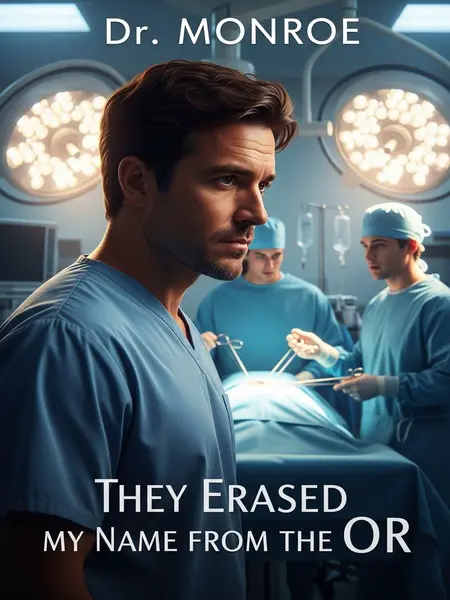Chapter 4: The Price of Integrity
I was about to go confront the administrator again when the door to the department burst open and Deputy Chief Dr. Michael Wren rushed in.
He looked harried, his tie askew, a coffee stain on his shirt. I hadn’t seen him move that fast since med school.
"Weren’t you off today, Mike?"
He shrugged, running a hand through his hair. "Don’t ask. I was halfway to the golf course when they called."
He dropped his bag on a chair, exhaling sharply. His eyes flicked to my computer screen, but he didn’t comment.
"Surgery? What…?"
Before I could finish, the head nurse burst in, followed by Mrs. Lucas—the wife from room 72.
Mrs. Lucas clutched her purse, looking lost and frightened. I recognized her from the waiting room—a fixture by her husband’s bedside for weeks.
"Dr. Monroe, the nurse just came to update the chart, and the attending doctor’s name changed from you to Dr. Wren. Are you not treating us anymore?"
Her voice trembled. I saw tears welling in her eyes, and my chest tightened. I hated this part of the job—the human cost of hospital politics.
The head nurse explained, "Of course the hospital wants the best doctor for you. You should get back to the ward and prepare—the OR is being set up. Surgery will start soon."
She tried to sound upbeat, but her voice was brittle. Mrs. Lucas looked from her to me, confusion and fear etched into every line of her face.
Before I could say anything, Dr. Wren jumped in. "Which room are you?"
He stepped forward, all business, trying to take control of the situation.
"Room 72. Dr. Monroe was supposed to operate this morning, but suddenly—"
She trailed off, voice cracking. I saw her hands trembling as she clutched her purse tighter.
"Oh, got it. Go back and wait for news. I’ll operate on you soon."
He gave her a reassuring smile, but it didn’t reach his eyes. The whole room felt tense, the air heavy with unspoken questions.
Then he turned to me. "So that’s why I got called back. Wasn’t this your patient all along? Why pass him to me?"
He looked genuinely confused, his brow furrowed. I didn’t have an answer that would make sense.
Mrs. Lucas grabbed my sleeve, sobbing, "Dr. Monroe, how can you just abandon us? Is it because I didn’t give you a gift card? My family’s really struggling, but you cured my daughter before. We all thought you were a good doctor…"
Her sobs echoed in the small office. I felt my throat tighten. No matter what I said, it would sound wrong. The guilt gnawed at me.
No matter what I said, it would sound wrong.
I glanced at Dr. Wren, hoping for backup, but he just looked away. The silence was suffocating.
Dr. Wren put on his white coat and said to Mrs. Lucas, "Come with me. I’ll check on the patient first."
He reached out, gently guiding her to her feet. She clung to his arm, still sniffling. I watched them go, feeling helpless.
"Dr. Monroe… are you really not helping us anymore?" Mrs. Lucas was in tears.
Her voice followed me, soft and broken. I wanted to tell her the truth, but I knew it would only make things worse.
Priority was calming her down so it wouldn’t affect the patient.
I swallowed hard, forcing myself to sound calm. The patient’s health came first, always.
I said, "Mrs. Lucas, it’s not that I’m abandoning you. After careful consideration, the hospital leadership and I agreed that Dr. Wren has a higher success rate for your case. You know your husband’s condition is complicated—otherwise, we wouldn’t have waited until today for surgery. The hospital is acting in the patient’s best interest by having Dr. Wren lead the operation. Plus, Dr. Wren is the deputy chief of cardiothoracic—patients line up for him."
I forced a reassuring smile. She nodded slowly, wiping her eyes. I hoped she believed me, even if I barely believed myself.
That reassured Mrs. Lucas a bit, and she followed Dr. Wren out.
I watched them disappear down the hall. The ache in my chest grew sharper. I wondered if I’d ever see them again.
The system updated room 72’s surgery plan. The computer screen now showed Dr. Wren and Autumn Daniels as the lead doctors.
The new names glowed on the screen, cold and impersonal. My own name erased, like I’d never been there at all.
The hospital had bypassed me and directly interfered with my patient’s care. Even a fool could see they’d lost all patience with me.
The message was clear: I was being phased out. I sat back, letting the reality sink in. The walls of my office suddenly felt too close.
Since the new administrator took office last year, he’d pushed the idea of “growing the market through professionalism, boosting profits through management,” and launched sweeping reforms throughout the hospital.
I remembered his first day—slick suit, PowerPoint slides, buzzwords flying like confetti. He talked about innovation, efficiency, maximizing value. But beneath the gloss, the message was always the same: make more money.
After several days and nights of intensive training, I’d summed up the new administrator’s guiding principles: externally, brand marketing to attract patients nationwide; internally, KPI-based performance reviews, legally and reasonably getting patients to spend more.
I’d sat through endless workshops, watched as consultants scribbled flowcharts on whiteboards. The language was all about metrics, market share, and patient acquisition. The soul of the place—what little was left—was slowly being squeezed out.
For example, if a patient used to spend a thousand dollars to treat their illness, now, after the reforms, we attending doctors had to find ways to get them to spend two thousand. But we couldn’t let them spend it for nothing.
He’d explained it with a smile, as if doubling costs was a favor. I remembered the first time I balked at a suggested upsell—he’d called me old-fashioned, stuck in my ways. Maybe he was right.
How? The administrator explained it vividly: Before, after spending a thousand, the patient left the hospital weak, exhausted, not knowing if there were other issues or hidden risks. Now, after spending two thousand, they’re discharged full of energy, having had a full-body checkup, continuing medication to consolidate results—this, he said, was reasonable and legal profit creation.
He’d spun it as a win-win. But I saw the other side: patients confused, families stretched thin, trust eroding with every padded bill. My conscience ached every time I signed off on another unnecessary test.
Patients spent more, but got better treatment, better follow-up, and peace of mind. That, he said, was growing the market through professionalism, boosting profits through management.
The words echoed in my mind, hollow and rehearsed. I’d repeated them in meetings, but they never felt true. Not in my gut.
I was shocked, even baffled. Under his rules, we doctors weren’t just supposed to treat illnesses—we had to take care of nutrition, run full physicals, even screen for cancer and HIV. We had to work with nurses to create emotional value, making sure patients were happy while being treated so they’d accept the bill more easily.
I felt like a salesman in a white coat, hawking wellness packages and holistic care. The line between healer and hustler blurred, and I hated it.
To put it bluntly: it was over-treatment, sugar-coated.
We called it “value-added care” in meetings. In the break room, we called it what it was—padding the bill. The nurses joked about spa treatments and aromatherapy next.
In the year since the administrator took over, he’d talked to me countless times about profits, urging me to enrich treatment plans and choose medications more “precisely.”
He’d corner me in the hallway, spreadsheets in hand. His favorite phrase: “Are you maximizing patient value, Dr. Monroe?” I’d nod, smile, and walk away, teeth gritted.
I’d refused again and again, giving lip service while pushing back—testing the patience of the new leadership every time.
I knew I was skating on thin ice. But I couldn’t bring myself to play along. Not when lives were at stake.
Now, with my patients transferred and my surgeries taken away, the next step would surely be stripping me of my position—or even my medical license.
I pictured my office, the diplomas on the wall, the old stethoscope my father gave me. All of it felt like relics from another era. Maybe it was time to let go.
Maple Heights Medical was already making plenty of money, ranking among the nation’s top earners every year. Did we really need to chase even more?
I stared out the window, watching the sun slip behind the parking garage. The answer was obvious, but it still hurt.
Once again, I slumped in my chair, closed my eyes, and let time flow by.
The hum of the air conditioning was the only sound. I let myself drift, memories bubbling up—my first solo surgery, the late-night calls, the lives saved and lost. Twenty years, gone in a blink.
I’d gone from a green rookie to someone with a bit of reputation here—twenty years gone in a flash.
I remembered my first day—nervous, hopeful, certain I could make a difference. Now, I just felt tired. The hospital had changed, and maybe I had, too.
I’d told myself many times, in the end, I was just another employee—just happened to wear a white coat. What right did I have to defy the higher-ups?
The thought was oddly comforting. Maybe I’d been fighting a losing battle all along. Maybe it was time to stop.
Principles? Professionalism? Temper? What were those worth?
I let the question hang in the air. The answer, if there was one, eluded me. I stared at my hands—steady, capable, but suddenly unsure.
Too bad my family always joked I had a spine of steel—my back just wouldn’t bend.
The joke echoed in my mind, bittersweet. I smiled, despite everything. Maybe stubbornness was all I had left.
Maybe… maybe it was time for a break.
The thought crept in, quiet but insistent. I pictured a cabin in the woods, the sound of rain on the roof, no beepers, no administrators. The idea was tempting.













